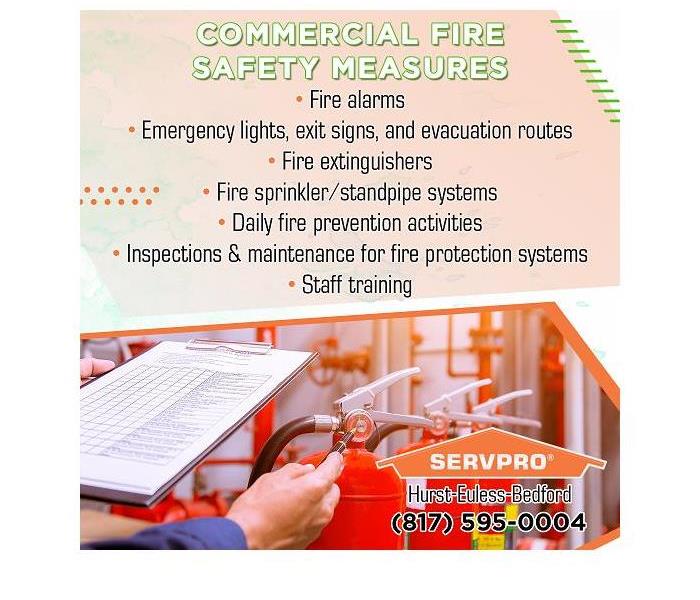What are the important commercial fire safety measures?
10/20/2021 (Permalink)
Blog summary: The SERVPRO article gives insight into the fire safety equipment and processes commercial buildings must follow to prevent fire incidents.
Commercial fire safety tips
Commercial fire safety is a combination of fire safety equipment and policies. Commercial buildings must follow some fire safety precautions to ensure the well-being of the employees and customers. Needless to say, fire prevention also protects the equipment, merchandise, raw material, documents, and the building itself. SERVPRO shares some commercial fire safety measures below.
- Fire alarms
Fire alarms are the most critical elements of a commercial building fire system. The sound of a fire alarm alerts everyone in the building of potential danger and announces the need for evacuation. A regular inspection and maintenance of the fire alarm can keep the system in prime condition. Fire drills help familiarize employees with the fire safety and evacuation procedures. Commercial building owners must conform to their local, state, and federal requirements for fire alarm systems to avoid any regulation penalties.
- Emergency lights, exit signs, and evacuation routes
A fire causes panic and chaos. Smoke from the fire and the loss of electrical power can disorient the people caught in the fire. Emergency lights and exit signs switch on when power is lost and can help people navigate through the building by lighting up the evacuation route. These lights and signs should be tested regularly to ensure proper functioning. A monthly 30-minute minimum function test and an annual 90-minute function test should also be conducted and documented.
Moreover, the evacuation route must be unobstructed. Fire doors, overhead doors, hallways, pathways, stairways, windows, and outdoor areas such as fire hydrant paths must be checked daily for any obstructive objects.
- Fire extinguishers
Fire extinguishers are mandatory in a commercial setting according to most fire codes. They are an effective means of extinguishing a small fire before it becomes an out-of-control blaze that makes evacuation impossible. Generally, fire extinguishers must be within reach and mounted on walls within 75 feet from any point. Extinguishers should also be mounted near exits to ensure easy access and avoid the need to go further into a burning building. Employees must be trained in how to operate a fire extinguisher. Additionally, regular maintenance and inspection of fire extinguishers ensure proper functioning when an emergency arrives.
- Fire sprinkler/standpipe systems
A sprinkler system reacts to heat and turns on a water sprinkler to suppress or extinguish larger fires. Standpipe systems are a series of pipes that connect a water supply to hose connections, basically an extension of the fire hydrant system. Sprinkler and standpipe systems need to be inspected and maintained by a licensed inspector to ensure smooth functioning. The control valves, system’s main drain, backflow device, and sprinkler pipes must be carefully tested regularly.
- Daily fire prevention activities
Commercial spaces have plenty of areas that can become fire hazards. The following steps can minimize these hazards:
- Stow the trash/waste in trash/recycling bins. Avoid piling up in any area, especially doorways.
- Extension cords should be industrial grade and grounded.
- All power strips must be UL listed with built-in circuit breakers.
- Cigarette butts and containers should be discarded far from the building, shrubbery, and flammable materials.
- Combustible materials/liquids must be stored securely in approved containers as per NFPA/OSHA regulations.
- Electrical appliances must be GFCI protected.
- No heat-producing equipment should be left on without supervision.
- Fire sprinkler piping or sprinkler heads shoul\d be clear of any obstructions or hangings.
- Fire pump rooms/riser rooms should only store fire protection equipment.
- All supplies/stock/merchandise must be kept at least 3 ft away from heating units and ductwork.
- Fire extinguishers should be inspected and maintained. They should be fully charged, undamaged, and accessible.
- Inspections & maintenance for fire protection systems
Preventative fire protection system inspections are the best deterrent against a dysfunctional system. The following components of the system must be regularly scheduled for inspection:
- Fire sprinkler systems
- Backflow preventer assemblies
- Fire suppression systems
- Kitchen hood suppression systems
- Fire alarms
- Fire extinguishers
- Alarms, monitors, detectors
Inspections ensure any faults are detected and amended in time, and the system works when there is an emergency.
- Staff training
Fire prevention equipment and procedures are pointless without trained staff to uphold the protocol and implement the processes. Every commercial establishment must educate its staff members on the causes of fire, train them to use fire extinguishers, and imbibe in them the daily fire-safety prevention routine. Holding annual fire safety training sessions is very helpful. Moreover, employees must be encouraged to be vigilant and report any potential fire hazards right away.
This training will ensure that employees can manage to prevent fires and evacuate calmly and safely in the event of a fire.
Why SERVPRO?
- SERVPRO uses state-of-the-art equipment to bring the damaged property back to its original state. SERVPRO of Hurst-Euless-Bedford is always updating its fleet and equipment so clients in Hurst, Euless, Bedford, or anywhere else can quickly access the services.
- With over 1,700 US and Canadian Franchise locations, SERVPRO is strategically positioned to respond faster to an emergency of any magnitude.
- The SERVPRO staff is highly trained in property damage restoration. They receive initial in-house training and constant skill-up-gradation at the corporate training facility and also acquire the regular IICRC-industry certification.
For commercial fire damage restoration services, call SERVPRO of Hurst-Euless-Bedford today at (817) 595-0004 or e-mail at office@SERVPROheb.com






 24/7 Emergency Service
24/7 Emergency Service
